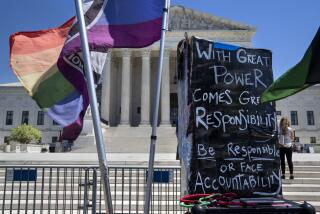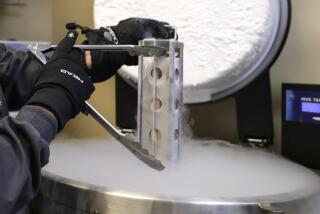Supreme Court: In vitro children might not be due benefits
WASHINGTON -- A child who was conceived from the sperm of a father who had died is not automatically entitled to Social Security benefits as his survivor, the Supreme Court ruled Monday.
The 9-0 decision upholds the government’s multi-part definition of who qualifies as a survivor under the Social Security law. One requirement is that a “natural child” is one who is entitled to inherit the father’s property under state law.
“Tragic circumstances gave rise to this case,” said Justice Ruth Bader Ginsburg, noting that Robert Capato died of cancer in Florida in 2002 before he and his wife, Karen, could have the family they envisioned.
About 18 months after his death, Karen gave birth to twins who were conceived through in vitro fertilization. She sought survivors benefits for the two children, but the Social Security Administration rejected her claim.
Its officials said a “natural child” is one who “could inherit” the father’s property under state law. Under Florida law, “children conceived after a parent’s death” are not entitled to inherit his property, Ginsburg said. The children were not named in his will.
The court’s opinion in Astrue vs. Capato said the result might well be different in other states, such as California. She said “posthumously conceived children” can inherit property in California “if the child is in utero within two years of a parent’s death.” She cited similar provisions in Colorado, Iowa, Louisiana and North Dakota.
ALSO:
Dharun Ravi sentenced to jail in Rutgers webcam case
NAACP endorses same-sex marriage, says it’s a civil right
Judge in Jerry Sandusky case: No delay in child sex-abuse trial
More to Read
Start your day right
Sign up for Essential California for news, features and recommendations from the L.A. Times and beyond in your inbox six days a week.
You may occasionally receive promotional content from the Los Angeles Times.






